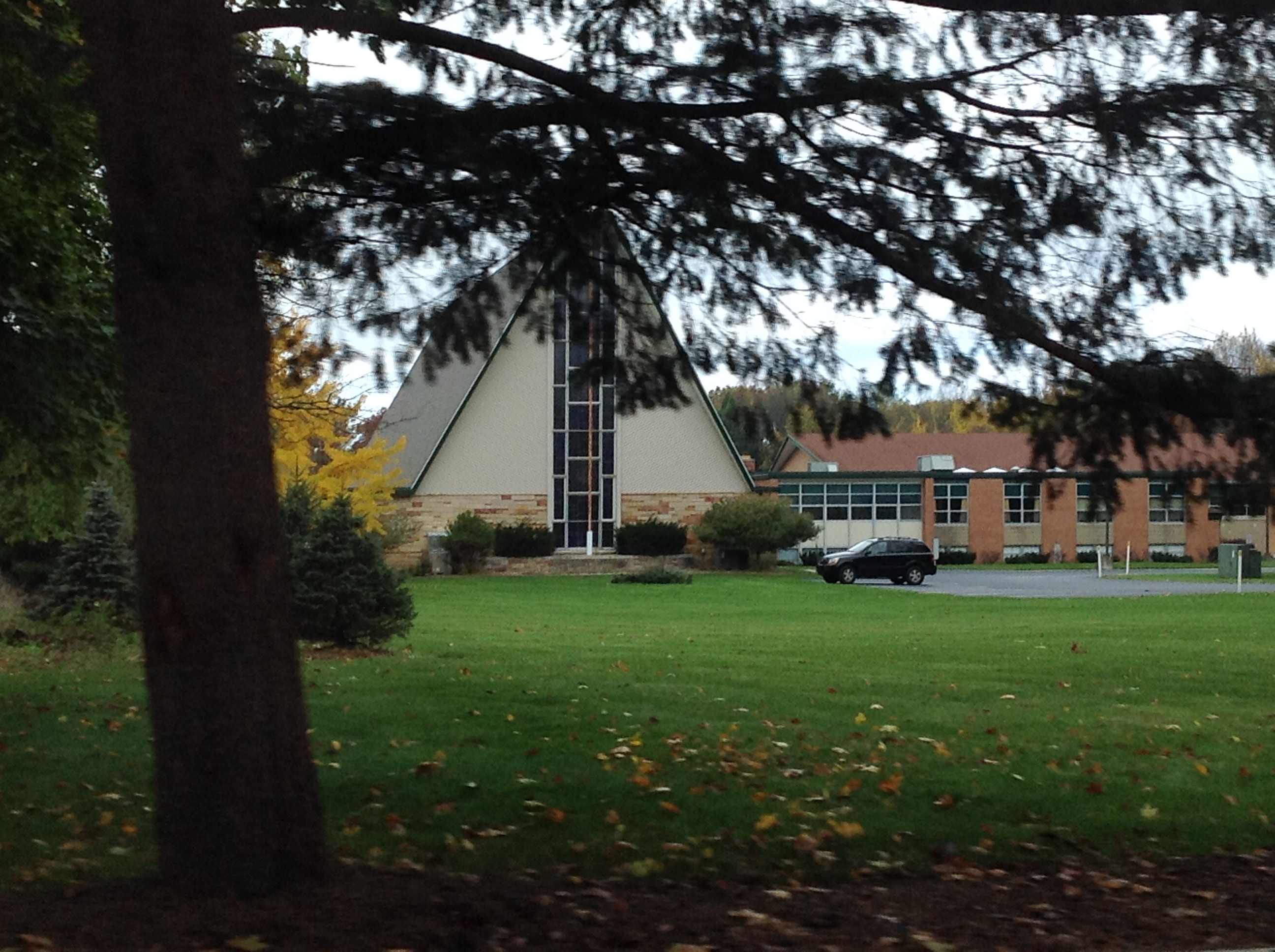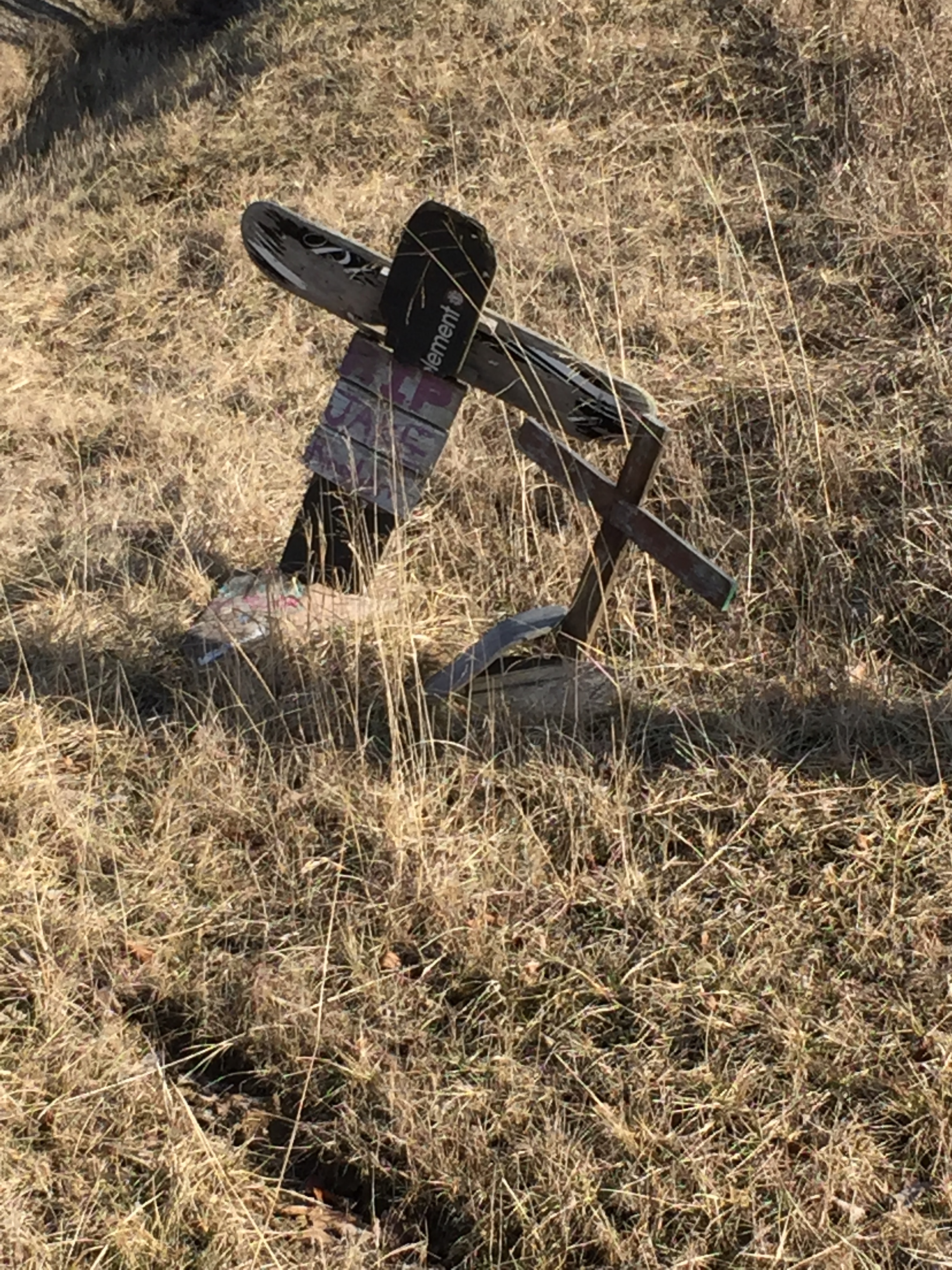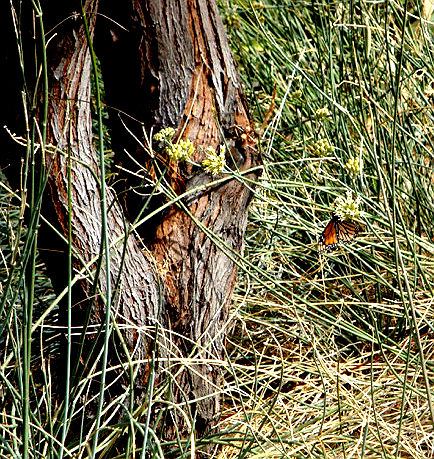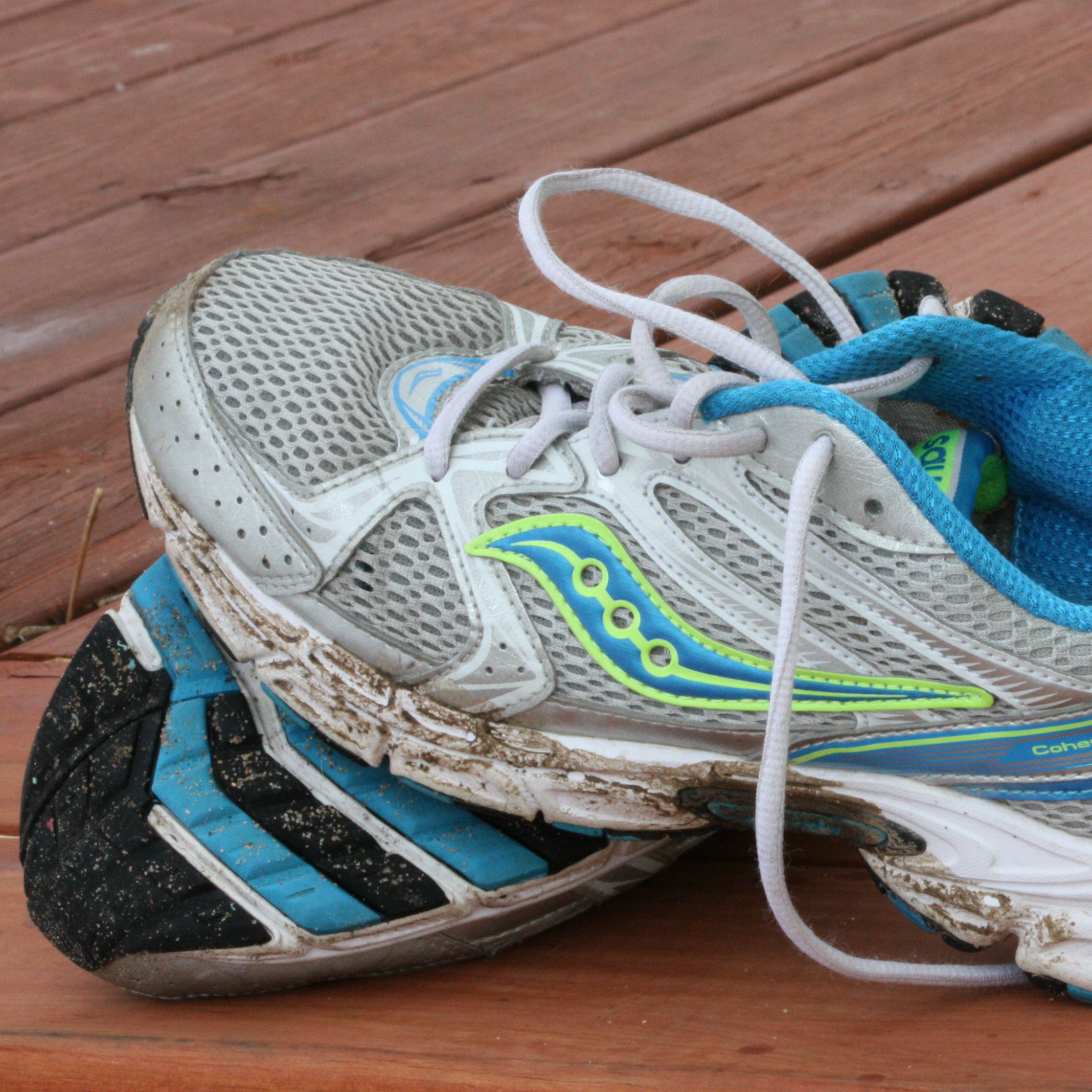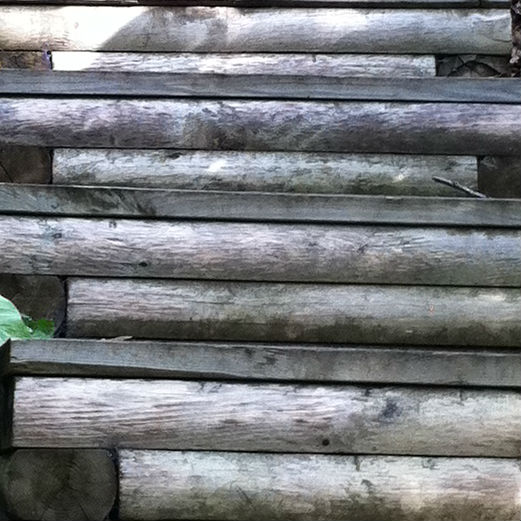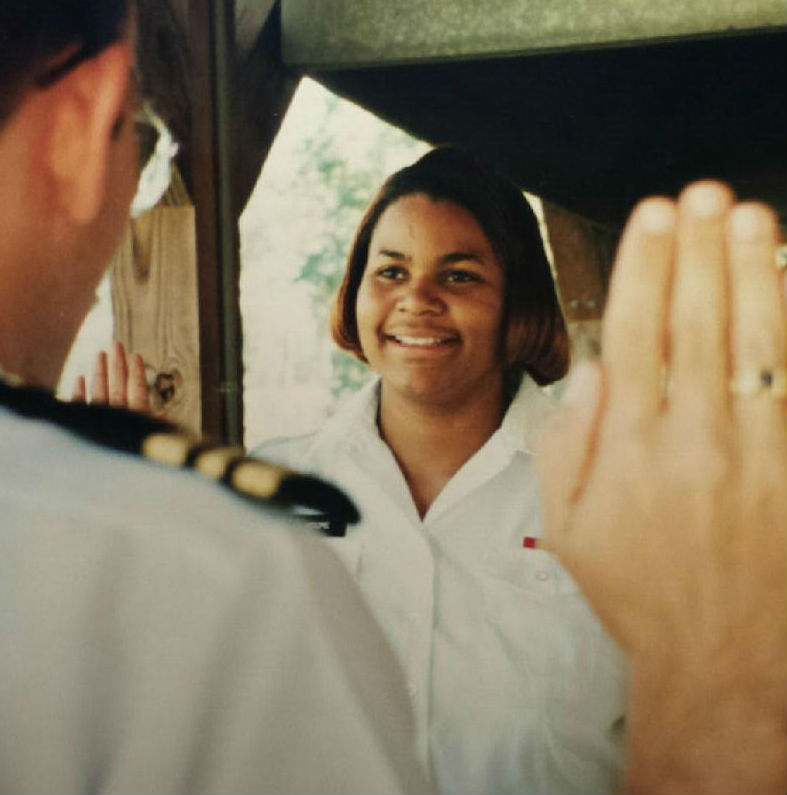With the peak of its A-frame pointing skyward toward our heavenly goal, the First Methodist Church marked the entrance to our neighborhood. Oaks and pine trees shed their acorns and needles on the church yard. Chattering squirrels and birds made their homes outside the stained glass window. Church leaders had installed one swing set and one seesaw next to the big parking lot and called them a playground. Crabapple trees, which bordered the lot, tempted bored children with their hard, bitter fruit.
My parents and brother and I lived a lazy walk down the street from the church. As I approached my teen years, I refused to walk side by side with them after services, but plowed ahead, head bent and watching my Kelly green patent leather pumps rotate beneath me. “Where you going so fast, Lu?” Dad called out.
Mom had let me wear nylons, and my feet slid around in the low-heeled pumps. My little brother ran past me, his short brown hair ruffling in the breeze. “Slowpoke!” he called. I felt as if I were rising up like a crocus out of the earth, bursting with expectation.
The summer I turned thirteen, at the boundary of our backyard, my parents planted a garden of tomatoes, string beans, and zucchini. Next door, the old man’s garden soil was darker and richer. His tasseled corn could be eaten crisp off the cob. Adjacent to our garden was my tether ball court, and on the other side of the concrete slab, the playhouse my father had built me smiled its crescent moon grin. Dad’s joke was that crescent moons used to mark outhouses when he was a kid.
Along the back boundary of the houses on the other side of my street was a forest of Balsam firs and white pines known as “The Pines.” At one end of the pines was the church, and at the other end lived the minister in the parsonage with his wife, my piano teacher. Below my scales and arpeggios, I could hear the junior high boys playing softball outside. The timbre of the boys' voices called me to come play with them.
Under the trees, the earth was two inches thick with fallen needles. My friends and I hauled our sleeping bags out there for summer sleepovers, and sometimes Karen’s brother and his friends visited. Warm nights increased the pungent fragrance of the pine needles, which blended with the spicy scent of the teen boys.
One night Karen’s 13-year-old stepbrother kissed me and lay down beside me on my sleeping bag. In the midst of a carpet of cricket chirps, an animal beeped.
“What’s that?” My giggle startled me.
“It might be a tree frog,” he said, so close to me that I could smell his breath. “And the rest are crickets.”
“I had a pet cricket in fourth grade.” I’d known him for three years and had stayed overnight at their house plenty of times.
He lay on top of me, resting his length against mine. His mouth was a rock warm from the sun. A tiny bristle like sandy grit bit my upper lip. The other kids had paired off, as if we had partitioned into small separate countries. When Karen's brother and I finished kissing, he got up and pulled me to my feet. Within moments, we all ran under the stars, armed with toilet paper to decorate shrubs and cars.
The next day those same boys played ball in the street and ignored my friends and me as we sat on the curb. We talked and laughed and pretended the boys weren’t within yelling distance. This tacit agreement between our make-out partners and us went on for weeks.
Nearby, our first- and second-grade brothers, testing how far they could push us, rode by on their Schwinn Stingrays and Huffy bicycles, tossing insults at us. Skanks. Turds. What could they know?
After dinner one night, we girls decided to bring our sleeping bags to the playhouse. We played Candy Land with flashlights, but the cramped space was hot and we kept sticking our hands in spider webs, so we moved our sleeping bags out behind the playhouse to wait for the boys. As we lay on our backs and looked up, we saw the moon pregnant with meaning above us. I dreamed of years of romantic dates and dances ahead of me.
When the boys arrived, they had a new friend with them. He could have been the good-looking blond star of a 1950s juvenile delinquent movie. One of my other friends had decided she liked Karen’s brother, so when the others paired off, Blondie and I were left facing each other.
“Hey.” His top lip curled back, revealing large teeth.
He smelled like peaches warming in a sunny window.
“Hey.” My voice seemed to echo.
He was our age but looked older. The others moved further into the field, so that they became dark shapes in the near distance. He pulled me to him with one arm. I never thought of resisting.
Blondie's kiss started out like those of Karen’s brother, but within moments he thrust a fat wet wiggling thing in my mouth. It took me a moment to realize it was his tongue. He pressed me down to the ground and lay on top of me. His tongue was a powerful saltwater animal. His mouth was all over my face. Weed stalks and small stones jutted into my back through the thin sleeping bag.
He redirected his efforts to the double stitched inseam of my jeans, pushing and rubbing into the soft unknown place between my legs. His hands were so rough, so forceful, that I felt pain as he continued to push. Everywhere his body touched me was an intrusion, as if he invaded, not just my body, but also my mind. As he pushed me, I felt the force of his strength, his solidity and weight. My breath came shallow and quick, and a sense that I was suffocating agitated my stomach. I struggled to keep my mind from disconnecting from my body.
“Stop.” My cry was barely audible, but I pushed back at him, eventually shoving him off me. Without speaking or looking at me, he grabbed a handful of tall weeds, yanked, and then broke them into pieces, pretending that nothing had happened.
I retreated into the playhouse, where I huddled on the floor in the corner. I gathered my knees into my arms. Within minutes, the boys decided it was time to go. My friends waved at the boys, and the boys waved back. I just stared at them though the playhouse window. I had entered a world separate from my girlfriends, as if from that night on, nothing was a certainty.
School started a few days later. Although my friends were not in any of my classes, Blondie turned up in my English class. I refused to look at him. He sat in the back row and joked loudly with another boy. A couple of weeks into the semester, our teacher went to the office while we worked on an assignment. We were reading, searching for favorite poems for the poetry scrapbooks she had assigned. I had fallen headfirst into an Edna St. Vincent Millay poem when, suddenly, I felt a steel grip on my crotch. The hand shoved in between my legs belonged to an arm with blond hairs. The arm belonged to Blondie.
“Get away!” I threw his arm away from me. The classroom around me grew tight and mirrored, with bodiless faces replicated ad nauseam, all staring at me. I refused to look at him as he sauntered back to his seat, but I could feel the smirk at my back.
As I walked home from school with my friends, I tuned them out as they hashed over the day about who was kicked out of study hall and smoke bombs in the boys’ bathroom.
Karen asked me why I was so quiet. I must have been in shock about Blondie being in my class. I listened to the girls around me, feeling as though I were in the empty middle of the ring of life. In that emptiness, I found the blistering wheel of humiliation.
I heard a boy’s voice behind us. “You can run, but you can’t hide.” Looking back, I saw that Blondie was shadowing us, sauntering, his books carried at his hip. Toxic dread filled my body.
My friends giggled. “Maybe he likes you.” Karen poked my waist. I ignored her. Nobody really knew him or where he had come from. We kept walking, ignoring Blondie, until I saw him mosey up the steep driveway and into a ranch house.
For weeks afterward, I surrounded myself with girlfriends, making sure I was never alone. In class, I kept a heavy textbook open on my lap. Nevertheless, Blondie managed two more times to bolt across the aisle and up several seats to grab me. Each time I slapped him away. He sneered and, the second time, he winked. While I burned with humiliation, the other students now kept their noses in their books. Did they really not see what was happening? Or were they colluding with him?
The fourth time, venom burst in my stomach. I was blind to the exterior world and reacted with the poison rising within. I slapped his face. Hard. My hand hurt. Even his jawbone was sharp, a danger to me. He pulled back, surprised. Some students had looked up at the crack of my hand on his gritty oil-paper cheek.
That afternoon, my friends let me lag a step behind. With the shame so thick inside, I couldn't confide in my friends. But they were now used to my silence. The whoosh and blast of wind as each car passed us made me sway. Unsteady, I planted my feet heavier and heavier on the sidewalk with each step. Some leaves still hung from the oak branches above, as I crunched through the fallen dead leaves. How had I missed the brilliant reds and yellows of the trees the past few weeks?
As my friends turned toward the church and waited for a lull in the traffic, I caught sight of a squirrel lying under a large oak on someone's front lawn. I ran toward the animal, without a word to the girls. Kneeling on the grass, I took in the squirrel's graceful muzzle and nose, noted the dull black of its eyes.
A moment later, I noticed that the gut had burst—whether from a predator or not, I didn't know, but the legs and luxurious tail appeared as if the animal were alive. The squirrel's innards were open to view, like the plastic models of human anatomy in our science classroom. Rather than an illuminating glimpse, the flesh moved as if the squirrel were alive deep down inside. A half-beat later, I realized a mass of larvae writhed, working diligently on the dead tissue. I'd never seen death or what comes after. Now I witnessed the dead squirrel changing, in process of becoming.
I knew from science class that the maggots, though revolting, were necessary to the cycle of life. I shivered in recognition, as if I were witnessing something I had sensed was going on inside of me.
"Eew, disgusting." Karen had followed and stood over me, her shadow falling to the right of the carcass. She tugged on my shoulder. "Come on."
Reluctantly, I rose, willing myself to look once more at the squirrel's face, rather than the maggot infestation. Karen and I crossed the main street that separated our neighborhood from the city, joining the others who waited for us on the sidewalk. When a girl asked why we ran to the tree, Karen spoke without emotion. "Dead squirrel." Neither of us mentioned the maggots. We trudged past the church, marking our path home--through the parking lot, around the pines that never lost their color, and down the street toward our houses.
Luanne Castle’s poetry and prose have appeared in: Grist; River Teeth, Lunch Ticket; The Story Shack; Phoebe; The Review Review; and many other journals. Doll God, her first collection of poetry, was winner of the 2015 New Mexico-Arizona Book Award. Luanne studied at the University of California, Riverside (PhD); Western Michigan University (MFA); and at Stanford University. Now she divides her time between California and Arizona, where she shares land with a herd of javelina.
